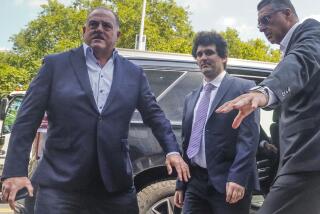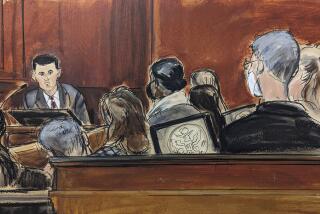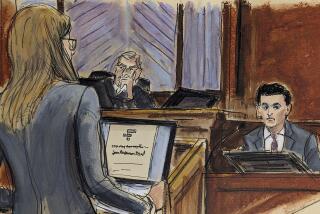Questioning of Jurors Hints at Keating Defense : Trial: The attorney fighting securities fraud charges against the former owner of Lincoln Savings & Loan will focus on his reliance on outside advice.
- Share via
LOS ANGELES — The lawyer for Charles H. Keating Jr. gave prospective jurors a preview of a key defense they may hear once testimony begins in the state securities fraud trial of the former Lincoln Savings & Loan owner.
In the final phase of jury selection Monday, defense lawyer Stephen C. Neal asked one jury candidate--a retired accountant for Lockheed Corp.--if he relied on the aerospace company’s outside auditors in helping him with accounting issues.
“Definitely, or we wouldn’t have hired them,” the prospective juror replied.
Keating’s reliance on the advice and help of accountants and lawyers will be a cornerstone in his defense to 20 counts of violating state securities laws in the sale of his company’s bonds through Lincoln’s Southern California branches.
The prosecution will try to show, though, that Keating knew that his company, American Continental Corp., was financially troubled and yet misled small investors about the safety of the bonds and the soundness of the company. The Phoenix company owned Irvine-based Lincoln.
The collapse of Lincoln and American Continental in April, 1989, wiped out more than $250 million from corporate investors and left taxpayers with a $2.6-billion clean-up bill for the thrift, making it the biggest thrift failure to date.
The Los Angeles County Superior Court case is the first criminal proceeding stemming from Lincoln’s collapse to come to trial. It is narrowly focused on investors who bought 20 bonds for a total of about $1.8 million. Keating is accused of being responsible for false statements or omissions of material information in the sale of those bonds.
A panel of about 100 prospective jurors who passed the first phase of jury selection two weeks ago jammed the courtroom. Judge Lance A. Ito questioned nearly two dozen individually before allowing them to be quizzed by Neal and William Hodgman, the lead deputy district attorney prosecuting the case.
That first group, consisting mostly of government workers and retired people, said they could lay aside any prejudices or preconceptions they had and determine fairly the fate of the 67-year-old Keating, who has become the leading symbol of nation’s S&L; crisis.
On Monday, Neal laid out part of his defense in questioning two prospective jurors, both former accountants.
Like the retired Lockheed accountant, a former accountant from Paramount Pictures Corp. said he, too, relied on outside accountants for help on such productions as “Black Sunday” and “Shogun.”
Neal also hopes to portray some of Keating’s strong statements as sarcastic jokes if Judge Ito denies a defense motion to ban those comments.
One federal regulator, for instance, asked Keating why he didn’t sit on Lincoln’s board of directors and was told: “I don’t trust the regulators. I don’t want to go to jail.”
He also asked a subordinate “why they couldn’t cheat” on a bond sales technique and told a federal regulator that if Lincoln was seized, “you guys will be faced with a $2-billion loss.”
The defense argues that such comments are irrelevant, misleading or confusing. But the prosecution contends that the remarks show Keating’s knowledge about the weak financial condition of Lincoln and American Continental and show his willingness to break the law.
The judge has scheduled a hearing on the issue for Wednesday, but may change it to today if jury selection is completed early. So far, 11 jurors have been tentatively selected. Ito wants 20 jurors, including eight alternates.
Meanwhile, prosecutors are expected to ask a state appellate court later this week to overturn Ito’s ruling on the tough standard for proving Keating’s guilt. Ito is requiring prosecutors to show that Keating knew misleading statements were being made in the sale of the 20 bonds, that he intended to “aid, encourage or facilitate” those sales and that he acted or advised others in intentionally making misrepresentations.
More to Read
Inside the business of entertainment
The Wide Shot brings you news, analysis and insights on everything from streaming wars to production — and what it all means for the future.
You may occasionally receive promotional content from the Los Angeles Times.







